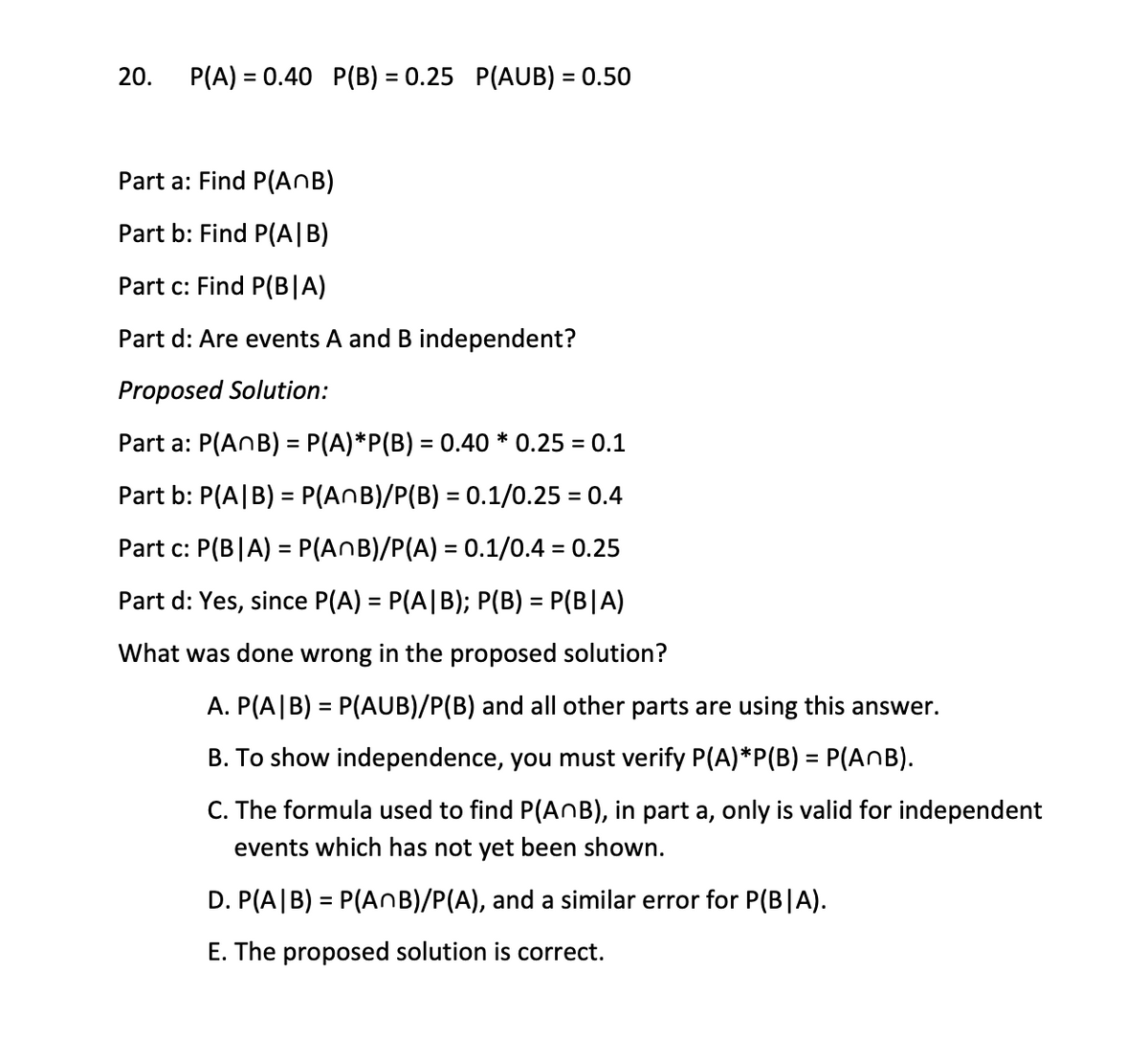20. P(A) = 0.40 P(B) = 0.25 P(AUB) = 0.50 Part a: Find P(ANB) Part b: Find P(A/B) Part c: Find P(BIA) Part d: Are events A and B independent? Proposed Solution: Part a: P(AnB) = P(A)*P(B) = 0.40 * 0.25 = 0.1 Part b: P(A/B) = P(AnB)/P(B) = 0.1/0.25 = 0.4 Part c: P(B|A) = P(A^B)/P(A) = 0.1/0.4 = 0.25 Part d: Yes, since P(A) = P(A|B); P(B) = P(B|A) What was done wrong in the proposed solution? A. P(A/B) = P(AUB)/P(B) and all other parts are using this answer. B. To show independence, you must verify P(A)*P(B) = P(AnB). C. The formula used to find P(AnB), in part a, only is valid for independent events which has not yet been shown. D. P(A/B) = P(ANB)/P(A), and a similar error for P(B|A). E. The proposed solution is correct.
20. P(A) = 0.40 P(B) = 0.25 P(AUB) = 0.50 Part a: Find P(ANB) Part b: Find P(A/B) Part c: Find P(BIA) Part d: Are events A and B independent? Proposed Solution: Part a: P(AnB) = P(A)*P(B) = 0.40 * 0.25 = 0.1 Part b: P(A/B) = P(AnB)/P(B) = 0.1/0.25 = 0.4 Part c: P(B|A) = P(A^B)/P(A) = 0.1/0.4 = 0.25 Part d: Yes, since P(A) = P(A|B); P(B) = P(B|A) What was done wrong in the proposed solution? A. P(A/B) = P(AUB)/P(B) and all other parts are using this answer. B. To show independence, you must verify P(A)*P(B) = P(AnB). C. The formula used to find P(AnB), in part a, only is valid for independent events which has not yet been shown. D. P(A/B) = P(ANB)/P(A), and a similar error for P(B|A). E. The proposed solution is correct.
College Algebra
7th Edition
ISBN:9781305115545
Author:James Stewart, Lothar Redlin, Saleem Watson
Publisher:James Stewart, Lothar Redlin, Saleem Watson
Chapter9: Counting And Probability
Section: Chapter Questions
Problem 3P: Dividing a Jackpot A game between two pIayers consists of tossing coin. Player A gets a point if the...
Related questions
Question

Transcribed Image Text:20. P(A) = 0.40 P(B) = 0.25 P(AUB) = 0.50
Part a: Find P(ANB)
Part b: Find P(A/B)
Part c: Find P(BIA)
Part d: Are events A and B independent?
Proposed Solution:
Part a: P(AnB) = P(A)*P(B) = 0.40 * 0.25 = 0.1
Part b: P(A|B) = P(AnB)/P(B) = 0.1/0.25 = 0.4
Part c: P(B|A) = P(AnB)/P(A) = 0.1/0.4 = 0.25
Part d: Yes, since P(A) = P(A|B); P(B) = P(B|A)
What was done wrong in the proposed solution?
A. P(A|B) = P(AUB)/P(B) and all other parts are using this answer.
B. To show independence, you must verify P(A)*P(B) = P(ANB).
C. The formula used to find P(AnB), in part a, only is valid for independent
events which has not yet been shown.
D. P(A/B) = P(ANB)/P(A), and a similar error for P(BIA).
E. The proposed solution is correct.
Expert Solution
This question has been solved!
Explore an expertly crafted, step-by-step solution for a thorough understanding of key concepts.
This is a popular solution!
Trending now
This is a popular solution!
Step by step
Solved in 4 steps with 4 images

Recommended textbooks for you

College Algebra
Algebra
ISBN:
9781305115545
Author:
James Stewart, Lothar Redlin, Saleem Watson
Publisher:
Cengage Learning

Holt Mcdougal Larson Pre-algebra: Student Edition…
Algebra
ISBN:
9780547587776
Author:
HOLT MCDOUGAL
Publisher:
HOLT MCDOUGAL

Algebra & Trigonometry with Analytic Geometry
Algebra
ISBN:
9781133382119
Author:
Swokowski
Publisher:
Cengage

College Algebra
Algebra
ISBN:
9781305115545
Author:
James Stewart, Lothar Redlin, Saleem Watson
Publisher:
Cengage Learning

Holt Mcdougal Larson Pre-algebra: Student Edition…
Algebra
ISBN:
9780547587776
Author:
HOLT MCDOUGAL
Publisher:
HOLT MCDOUGAL

Algebra & Trigonometry with Analytic Geometry
Algebra
ISBN:
9781133382119
Author:
Swokowski
Publisher:
Cengage
